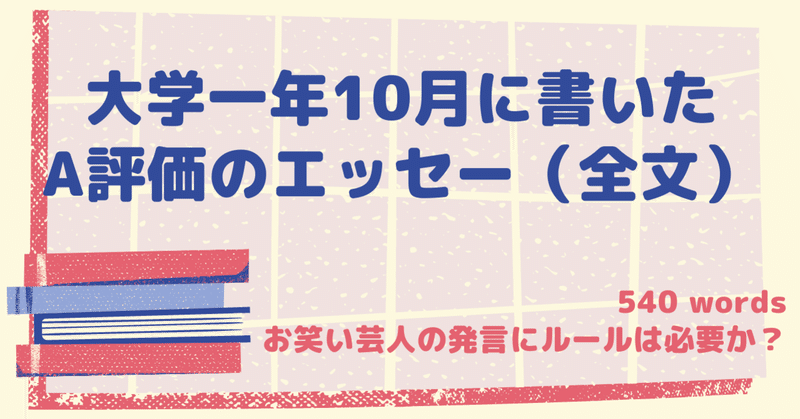
A評価だった英語のエッセー公開| お笑い芸人の発言にルールは必要?
大学一年次に英語の授業で書いたエッセーを公開します🌸
2020年はお笑い芸人の発言がよく炎上していたので、「お笑い芸人の発言や行動に規制はあるべき?」というテーマで約540wordsのエッセーを書きました。
A(最高評価)を頂いたので、「大学ではこのレベルでA評価になるんだな〜」と参考にしていただけると思います。
引用(citation)について学ぶ前だったので、参照先や引用元は記載しておりません!🙇♀️
Questioning the Need of Regulations on Comedians
These days comedians are afraid of being flamed by watchers. In fact, there have been many examples that comedians got under fire for their impropriate or discriminative remarks. As a result, some people claim that there should be official regulations on comedians’ words and deeds in comedy. However, to recognize the main goal of this discussion as balancing the morality and quality of comedy, it seems that such regulations are irrelevant and may bring about serious negative effects. There are two reasons which support the idea that rules do not count.
First, it surely depends on the context whether a remark is appropriate, thereby one single policy cannot be applied to all the programs. For instance, Zoffy, a pair of comedians in Japan, are flamed with a skit they played in King of Conte, a famous tournament of skit in Japan. In the skit they play, dinner is not ready because a mother has left home for family issues. A son says “Why is mom not here? I can’t keep my head.……Where’s dinner!!”. The reason why this skit was exposed to criticism is that guys call their mother “Food.” Thus, it is reasonable to beat this play as it stereotypes and looks down on mothers. At the same time, one of the funny points of this play is that they are obsessed with food even though their lovable mother has left. As a result, it seems that zealous critics, who are not a big fan of comedy but inadvertently watch the TV program, tend to criticize this skit, and people familiar with comedy tend to respect this play as it is so deliberate. Consequently, as this example indicates, it relies on the place, time or a context whether a remark is seen offensive. This means that it is almost impossible to apply a same rule to all the programs.
Second, regulations would erase the traditional characteristic of comedy, which is that comedians kick against the authorities. Historically, comedy has been developed with criticizing powerful authorities. In Shouten, a TV program in which six Rakugo performers appear, remarks that point out defects of authorities in power are sometimes seen. In addition, comedians make fun of authorities in stand-up comedy or Manzai. This is a natural custom, given that comedy comes from underground culture, which is different from the mainstream of society and resists authorities. Young comedians experience tough times in underground venues in general. Consequently, if a powerful rule that comedians must follow came into force, resistance from comedians, which is in fact a traditional characteristic of comedy, would be diminished.
In conclusion, imposing a harsh regulation on comedians’ words and deeds is not a solution for balancing the quality and morality of comedy. First, a same rule is not appliable in all the situations. One play or Manzai could be interpreted in different ways according to the situation. In addition, comedy has been developed with a spirit of resistance. A rule that imposed from the top could devastate this historical feature of comedy. Although comedians must be careful not to give discriminative words and deeds, it is obvious that controls over comedians would not be effective and affect the quality of comedy severely.
最後までお読みいただき、ありがとうございました!
私が在籍する津田塾大学総合政策学部については、YouTubeで紹介しておりますのでご興味ある方はそちらもご覧ください!
この記事が気に入ったらサポートをしてみませんか?
